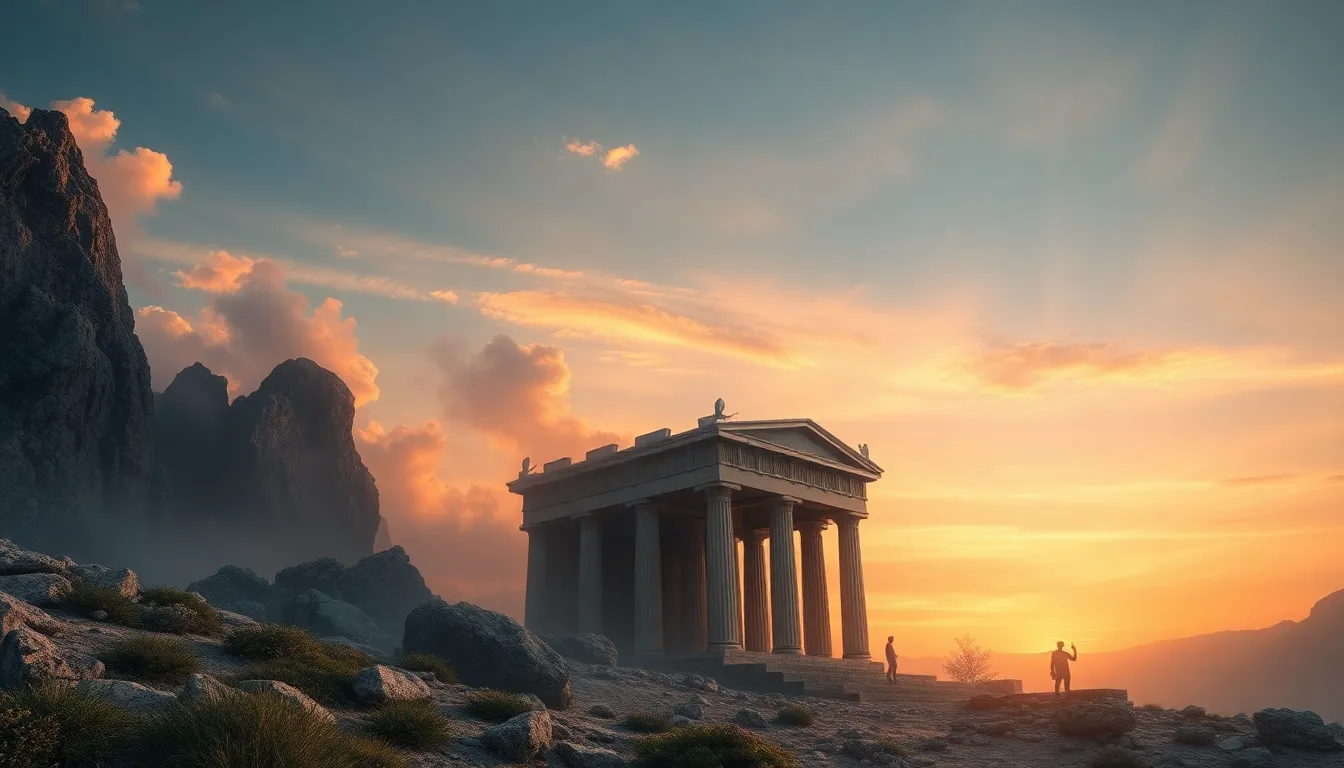Chaos and the Nature of Reality in Greek Philosophical Thought
I. Introduction
Chaos, in the context of Greek philosophy, refers to the primordial state of existence that preceded the ordered cosmos. It is often depicted as a vast void or an unformed mass from which all things emerged. Understanding chaos is pivotal for grasping the Greek conception of reality, as it serves as the backdrop against which order, structure, and meaning are introduced.
This article aims to explore the significance of chaos in Greek philosophical thought, tracing its evolution from mythological origins to its role in shaping metaphysical frameworks. We will examine key figures and ideas that contributed to the philosophical discourse surrounding chaos and its implications for understanding reality.
II. Historical Background: The Concept of Chaos
The concept of chaos has deep roots in early Greek thought, particularly in the works of pre-Socratic philosophers. Initially, chaos was understood through mythological lenses, where it represented the formless state before creation.
As philosophical inquiry progressed, thinkers began to transition from these mythological interpretations to more abstract, rational concepts of chaos. This shift marked a significant development in the understanding of reality.
Key figures in this transition include:
- Hesiod: In his work “Theogony,” Hesiod describes chaos as the first entity to exist, from which other primordial beings emerged. This narrative reflects the intertwining of myth and early philosophical thought.
- Other Pre-Socratic Thinkers: Various philosophers contributed to the evolving notion of chaos, laying the groundwork for later metaphysical discussions.
III. Chaos in Pre-Socratic Philosophy
Pre-Socratic philosophers provided diverse interpretations of chaos, each contributing unique perspectives to the philosophical landscape.
Anaximander, for instance, introduced the concept of the “apeiron,” or the boundless, as a primordial substance that encompasses all things. This idea suggests a chaotic reality from which ordered existence arises.
Heraclitus emphasized constant change and flux, encapsulated in his famous assertion that “everything flows.” For Heraclitus, chaos is intrinsic to the nature of reality, highlighting the dynamic interplay between order and disorder.
Pythagoras approached chaos with a mathematical lens, suggesting that numbers and their relationships underlie the cosmos. This viewpoint intertwines chaos with order through mathematical principles, illustrating the complexity of reality.
IV. Chaos and the Cosmological Order
Plato’s work, particularly the “Timaeus,” offers a profound exploration of chaos and order. In this dialogue, Plato presents a cosmological view where order emerges from chaos through the intervention of the Demiurge, a divine craftsman.
The Demiurge shapes the chaotic universe into a structured reality, emphasizing the duality of chaos and order in Plato’s metaphysics. The process of creation reflects a deliberate act of bringing harmony to the initial chaos.
Key aspects of this cosmological order include:
- The role of the Demiurge as a rational force.
- The idea that chaos is not inherently negative but serves as a canvas for creation.
- The interplay of dualities in Plato’s thought, where chaos and order coexist to form a complete understanding of reality.
V. Aristotle’s Critique of Chaos
Aristotle presented a critical perspective on the concept of chaos in his natural philosophy. He rejected the notion of pre-existing chaos as a starting point for understanding reality.
Instead, Aristotle posited that everything has an essence and substance that defines its nature. He emphasized the importance of actualization, where potentiality evolves into actuality within a structured framework.
The relationship between chaos, potentiality, and actuality is crucial in Aristotle’s thought, as he argued that chaos does not serve as a foundational principle but rather as a transitional stage in the process of becoming.
VI. Stoicism and the Role of Chaos in Reality
Stoic philosophy offers another perspective on chaos, viewing the cosmos as a rational and ordered whole. For the Stoics, chaos is an integral part of the natural order, necessary for change and transformation.
They believed that chaos facilitates the unfolding of fate, where events are interconnected within a grand design. This interplay between chaos and human agency forms a significant aspect of Stoic thought.
Key points of Stoic philosophy include:
- The cosmos as a rational entity governed by logos (reason).
- Chaos as a precursor to growth and evolution.
- The acceptance of chaos as part of the divine order, influencing human actions and choices.
VII. The Influence of Chaos on Later Philosophical Thought
The legacy of Greek philosophical concepts of chaos extends into later Western philosophy. The discussions surrounding chaos influenced various philosophical movements, including existentialism, which grapples with the absurdity and randomness of existence.
Modern theories of chaos, particularly in science and mathematics, draw from these ancient philosophical inquiries. The ongoing relevance of chaos in contemporary discourse reflects a continuous engagement with the complexities of existence.
VIII. Conclusion
In summary, the exploration of chaos in Greek philosophy reveals a rich tapestry of thought that has shaped our understanding of reality. From mythological origins to rigorous philosophical inquiry, chaos serves as a crucial element in the discourse on existence.
Reflecting on these insights allows us to appreciate the nuanced interplay between chaos and order, potentiality and actuality, as we seek to understand our own existence today. The enduring nature of chaos in philosophical inquiry invites us to continue exploring the depths of reality, challenging our perceptions and assumptions.




